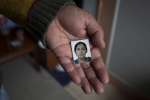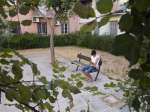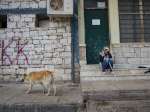UNHCR boosts presence in Greek islands to cope with soaring refugee arrivals
News Stories, 5 June 2015
GENEVA, June 5 (UNHCR) – The UN refugee agency on Friday said it was stepping up its field presence in the eastern Aegean islands of Greece where sea arrivals in recent weeks from Turkey have been averaging some 600 people a day, straining local reception capacities.
In the first five months of this year, more than 42,000 people arrived by sea in Greece, most of them refugees. This is six times the level of the same period last year (6,500) and almost the same as the total for all of 2014 (43,500). More than 90 per cent of the people arriving are from refugee-producing countries, principally Syria (over 60 per cent of arrivals this year), Afghanistan, Iraq, Somalia and Eritrea.
"The refugees cross the eastern Aegean Sea from Turkey in small, flimsy boats and inflatable dinghies. They are landing in as many as 15 different Greek islands or being rescued at sea by the Greek Coastguard," UNHCR spokesperson Melissa Fleming told journalists in Geneva. "The largest arrivals have been on Lesvos, Chios and Samos and the Dodecanese Islands, particularly Kos and Leros. Smaller numbers of refugees have also been crossing through Greece's land border with Turkey at Evros."
The large numbers of refugees arriving has led to bottlenecks, as the authorities struggle to identify, register and fingerprint them. The three existing reception facilities in Lesvos, Chios and Samos are severely overcrowded. Refugees awaiting registration, including families with children, have no choice but to sleep in the open. In addition, many refugees landing on remote beaches, including older people and small children, have to walk for miles carrying their meagre belongings because of the lack of transport.
There is no regular provision of food or drinking water to refugees, unless they are accommodated in police-run facilities for registration and processing. In some of the islands, volunteers have asked local restaurants and bakeries for food donations to distribute to the refugees who are sleeping rough or in unused buildings.
On Kos, where some 7,000 refugees have arrived so far this year, there are no official facilities for those awaiting registration, and conditions are particularly dire. Hundreds of women, children and men are sleeping in cramped and unsanitary conditions in an abandoned hotel.
Faced with a growing backlog of people waiting to register with the police and a deteriorating humanitarian situation, the authorities in Lesvos and Kos, in cooperation with the central government, have decided to allow Syrians with valid passports to board the regular passenger ferries to Athens to be registered there. Around 300 Syrians boarded the night ferries to Athens from Kos and 350 from Lesvos on Thursday.
"To respond to the critical situation in the Greek islands, UNHCR is increasing its personnel in Lesvos, Chios, Samos, Kos, Rhodes, Leros and Evros. Additional deployments are also being planned," Fleming said in Geneva.
UNHCR is already helping local authorities to improve reception conditions, identify additional accommodation for refugees, provide legal information and counselling to new arrivals and distribute sleeping bags and mats, soap, sanitary towels and other relief items to the most needy.
The refugee agency is requesting European Union institutions and agencies to further enhance the support provided to Greece, and for support to be given to non-governmental organizations to enable them to urgently support communities in the Greek islands and in southern Italy that are trying to deal with the challenges posed by the influx of refugees and migrants arriving irregularly by sea.
Fleming said that UNHCR estimates that as of the end of May, almost 90,000 refugees and migrants had crossed the Mediterranean in 2015. This includes some 46,500 who landed in Italy and the 42,000 in Greece. Smaller arrivals numbers have been recorded in Spain (920) and Malta (91). At the same time, 1,850 refugees or migrants have died or are missing at sea. During the same period last year, 49,000 people crossed the Mediterranean to southern Europe.















































